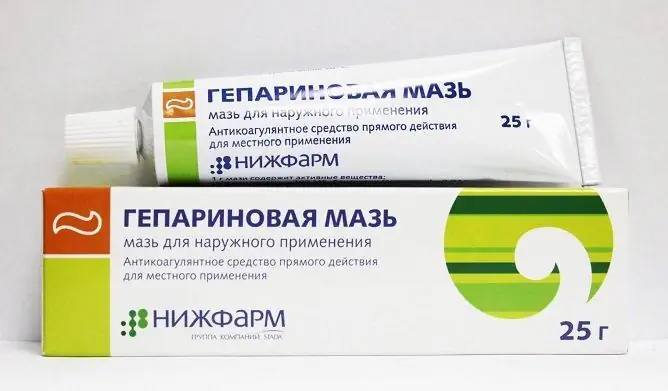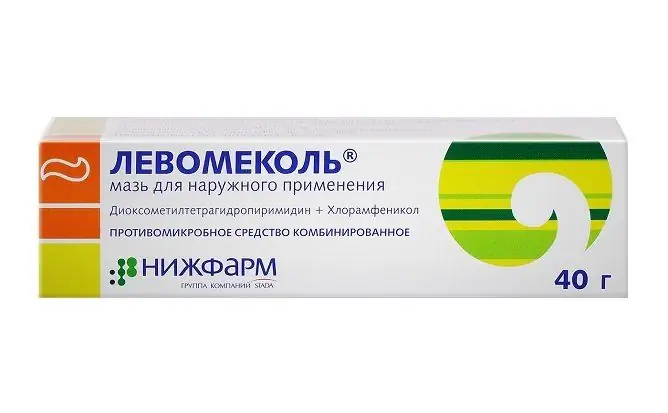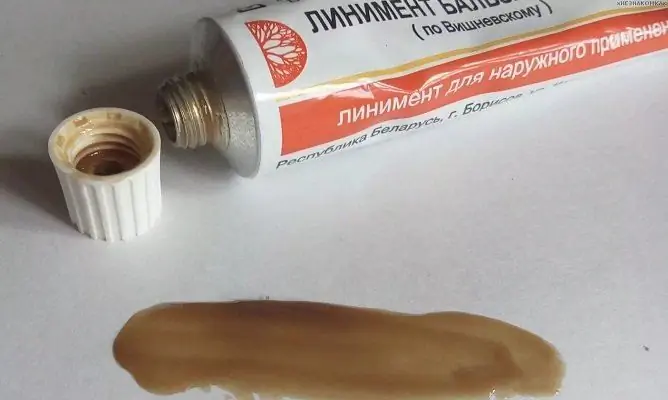- Author Rachel Wainwright wainwright@abchealthonline.com.
- Public 2023-12-15 07:39.
- Last modified 2025-11-02 20:14.
Daivobet
Daivobet: instructions for use and reviews
- 1. Release form and composition
- 2. Pharmacological properties
- 3. Indications for use
- 4. Contraindications
- 5. Method of application and dosage
- 6. Side effects
- 7. Overdose
- 8. Special instructions
- 9. Application during pregnancy and lactation
- 10. Use in childhood
- 11. In case of impaired renal function
- 12. For violations of liver function
- 13. Drug interactions
- 14. Analogs
- 15. Terms and conditions of storage
- 16. Terms of dispensing from pharmacies
- 17. Reviews
- 18. Price in pharmacies
Latin name: Daivobet
ATX code: D05AX52
Active ingredient: betamethasone (betamethasone) + calcipotriol (calcipotriol)
Producer: Leo Pharma A / S (Denmark), Leo Laboratories Limited (Ireland)
Description and photo update: 2019-20-08
Prices in pharmacies: from 673 rubles.
Buy

Daivobet is a combined drug with anti-inflammatory, antiproliferative, vasoconstrictor, antipruritic and immunosuppressive effects, used to treat psoriasis.
Release form and composition
Dosage form - ointment for external use: homogeneous, from almost white to pale yellow (15 g, 30 g, 60 g in aluminum or polyethylene tubes, 1 tube in a cardboard box).
Active ingredients in 1 gram of ointment:
- Betamethasone dipropionate - 643 mcg, which is equivalent to 500 mcg of betamethasone;
- Calcipotriol monohydrate - 52 mcg, which is equivalent to 50 mcg of calcipotriol.
Additional substances: white soft paraffin, polyoxypropylene-15-stearyl ether, liquid paraffin, α-tocopherol.
Pharmacological properties
Pharmacodynamics
Daivobet is a combined preparation, the effect of which is due to the properties of the active ingredients:
- calcipotriol is a synthetic analogue of the active metabolite of vitamin D. It leads to inhibition of proliferation of keratinocytes and acceleration of their morphological differentiation;
- betamethasone is a topical glucocorticosteroid; has a local antipruritic, anti-inflammatory, immunosuppressive and vasoconstrictor effect.
Pharmacokinetics
Absorption of the active components of Daivobet through intact skin is less than 1%. In the case of applying the ointment on psoriatic plaques and under occlusive dressings, the absorption of betamethasone increases. Elimination of the drug from the skin takes several days.
Betamethasone metabolism occurs in the kidneys and liver. As a result, glucuronides and sulfoesters are formed. Excretion is carried out through the kidneys and intestines.
Indications for use
According to the instructions, Daivobet is a drug for the treatment of chronic vulgar plaque psoriasis.
Contraindications
- Psoriatic erythroderma;
- Pustular, exfoliative and guttate psoriasis;
- Viral skin infections (including chickenpox and herpes), bacterial, fungal, parasitic etiology;
- Atrophy and skin ulcers;
- Rosacea;
- Perioral dermatitis;
- Rosacea and acne vulgaris;
- Cutaneous manifestations of tuberculosis and syphilis;
- Ichthyosis;
- Increased fragility of skin vessels;
- Perianal and genital itching;
- Severe renal / hepatic impairment;
- Diseases accompanied by impaired calcium metabolism;
- Age under 18;
- Hypersensitivity to drug components.
The safety of using Daivobet during pregnancy and lactation has not been established, therefore, during these periods, the doctor can prescribe the drug only if, in his opinion, the expected benefits outweigh the potential risks.
Instructions for the use of Daivobet: method and dosage
Daivobet ointment is intended for external use: it should be applied in a thin layer to the affected skin once a day.
The maximum daily dose should not exceed 15 g, weekly - 100 g. Processing of no more than 30% of the body surface is allowed.
The duration of treatment is 4 weeks. If necessary, the doctor can prescribe repeated courses.
Side effects
Daivobet ointment can cause the following side effects from the skin and its appendages: often - rash, itching, burning sensation; infrequently - exacerbation of psoriasis, irritation, pain, erythema, dermatitis, folliculitis, pigmentation disorders at the site of ointment application; rarely - pustular psoriasis.
Calcipotriol - the second active substance of the drug - can cause acute pain, local irritation, burning, itching and dry skin, rash, erythema, eczema, dermatitis, exacerbation of psoriasis.
Long-term topical use of betamethasone can lead to the development of depigmentation, allergic contact dermatitis, colloidal degeneration of the skin, folliculitis, striae, hypertrichosis, telangiectasias, perioral dermatitis, skin atrophy, generalized pustular psoriasis, hypersensitivity and photosensitivity reactions, including isolated cases of facial edema and anecological edema …
Possible systemic reactions:
- Caused by calcipotriol: hypercalcemia, hypercalciuria;
- Due to betamethasone: infections, cataracts, increased intraocular pressure, suppression of the function of the adrenal cortex (these side effects are extremely rare, but sometimes they are characterized by a severe course, especially when the ointment is applied to large areas of the skin, under occlusive dressings or for a long time).
Overdose
The main symptoms: increased blood calcium levels, suppression of the function of the pituitary-adrenal system, followed by the development of reversible secondary adrenal insufficiency.
Therapy: canceling Daivobet and carrying out symptomatic treatment. In chronic toxicity, the drug should be withdrawn gradually.
special instructions
It is not recommended to apply Daivobet to the scalp, mucous membranes and facial skin, as well as to use it under an occlusive dressing, apply to folds and to large areas of the skin (more than 30% of the entire body surface).
Wash hands thoroughly after use.
If the recommended doses are exceeded, hypercalcemia may develop, which quickly disappears after dose reduction or drug withdrawal.
Since betamethasone is a potent glucocorticosteroid, other drugs from the same group should not be used during treatment.
In case of complication of psoriasis by secondary infection, appropriate antibiotic therapy should be carried out. If the infection gets worse, Daivobet should be canceled.
Excessive exposure to sunlight (both natural and artificial) should be avoided during treatment. The simultaneous use of ultraviolet rays is possible only if necessary, if the expected benefits outweigh the potential risks.
The drug does not have a negative effect on attention and reaction speed.
Application during pregnancy and lactation
Daivobet during pregnancy / lactation can be used under medical supervision after assessing the ratio of the expected benefit to the possible risk.
Pediatric use
Daivobet therapy is contraindicated in patients under 18 years of age.
With impaired renal function
Daivobet is not prescribed for patients with severe renal failure.
For violations of liver function
Daivobet is not prescribed for patients with severe hepatic impairment.
Drug interactions
There is no information on the interaction of Daivobet with other drugs.
Analogs
The analogue of Daivobet is Ksamiol.
Terms and conditions of storage
Store at a temperature not exceeding 25 ° C out of the reach of children.
Shelf life - 2 years, after the first opening of the tube - 3 months.
Terms of dispensing from pharmacies
Available without a prescription.
Reviews about Daivobet
Feedback from patients about Daivobet is quite contradictory. Many people note the high effectiveness of the drug, although sometimes symptoms may return after improvement. In other cases, it is indicated that the claimed therapeutic effect does not develop.
Some patients report the occurrence of adverse reactions. And almost all users call the cost of the ointment high.
The price of Daivobet in pharmacies
The approximate price for Daivobet (1 tube of 15 or 30 g each) is 1017-1227 or 1666-1938 rubles.
Daivobet: prices in online pharmacies
|
Drug name Price Pharmacy |
|
Daivobet ointment 15g 673 r Buy |
|
Daivobet ointment for external use 15 g 1 pc. 673 r Buy |
|
Daivobet ointment for external use 30 g 1 pc. 1220 RUB Buy |
|
Daivobet ointment 30g 1558 RUB Buy |

Anna Kozlova Medical journalist About the author
Education: Rostov State Medical University, specialty "General Medicine".
Information about the drug is generalized, provided for informational purposes only and does not replace the official instructions. Self-medication is hazardous to health!






